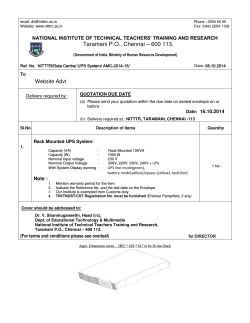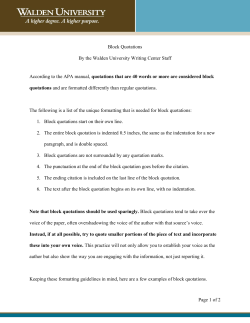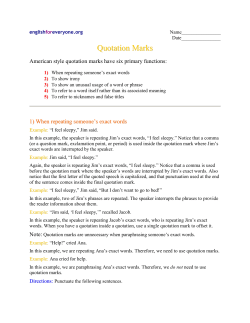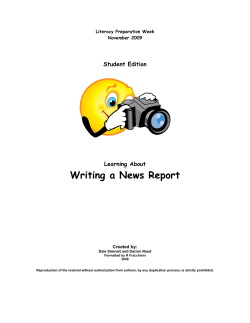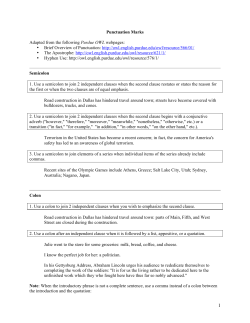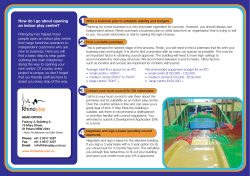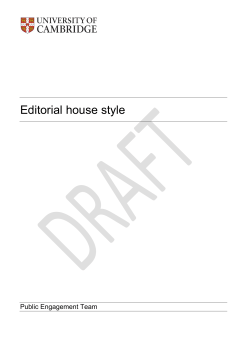
History of Play in Education White Paper # 06/2009
History of Play in Education Institute for Games for Learning NYU Education/Assessment Group White Paper # 06/2009 Version 0.1 Tsu-Ting Huang Jan L. Plass July 19, 2009 Introduction Game designers, Katie Salen and Eric Zimmerman, describe the relationship between game and play as mutually subordinate (2004). Engaging in games is a kind of playful activity. Play, on the other hand, is one major element that constitutes a game. To create an effective educational game, understanding the concepts of play in education is important. G4LI thus creates an annotated bibliography, collecting various educators’ and psychologists’ ideas of play throughout history. The goal is to find out how play is related to education and human developments. The results can be adopted in the educational game design in later phases of research. Following is a summary of the annotated bibliography. It is sorted by how play is related with education to distinguish various scholars’ points of view. 1. Play is important to education, learning, and human development John Locke: Play is the most important to children. Quotation: "…the chief art is to make everything that children have to do, sport and play too" (p. 38, Some thoughts concerning education, 1902). Immanuel Kant: Children learn by playing. Quotation: 1 ‚…children should be allowed to learn everything as it were in play‛ (p.67, Education, 1960). J. C. Friedrich von Schiller: A man is completed through play. Quotation: ‚…man only plays when in the full meaning of the word he is a man, and he is only completely a man when he plays‛ (Letters on the Aesthetic Education of Man, 1794). Friedrich Froebel: Play is the highest level of child development. Quotation: ‚Play is the highest phase of child-development – of human development at this period: for it is self-active representation of the inner – representation of the inner from inner necessity and impulse‛ (p.55, The Education of Man, 1887). G. Stanley Hall: Play is the basis of education. Quotations: ‚Play must be regarded as the greatest of all educational forces, the foundation of education‛ (p. 128, Genetic Philosophy of Education, 1912). ‚Education must begin in play, …‛ (p.112, Genetic Philosophy of Education, 1912). Johan Huizinga: Play is one bases of civilization. Play and culture are closely related, but play is not subordinated to culture. Quotations: 2 ‚…whereas for us the whole point is to show that genuine, pure play is one of the main bases of civilization‛ (p. 100, Nature and Significance of Play as a Cultural Phenomenon, 2005). ‚It [play] adorns life, amplifies it and is to that extent a necessity both for the individual – as a life function – and for society by reason of the meaning it contains, its significance, its expressive value, its spiritual and social associations, in short, as a cultural function‛ (p. 104, Nature and Significance of Play as a Cultural Phenomenon, 2005). ‚…real civilization cannot exist in the absence of a certain play-element, for civilization presupposes limitation and mastery of the self, the ability not to confuse its own tendencies with the ultimate and highest goal, but to understand that it is enclosed within certain bounds freely accepted. Civilization will, in a sense, always be played according to certain rules, and true civilization will always demand of fair play‛ (p.687, Play and Contest as Civilizing Function, 1955). 2. Education should be fun/ play engages children in learning Plato: Education is fun. Quotation: ‚…but let early education be a sort of amusement;‛ (The original French word also means ‚play‛) (p. 455, Republic, 1946). John Dewey: Children engage in schoolwork through play. 3 Quotation: ‚Experience has shown that when children have a chance at physical activities which bring their natural impulses into play, going to school is a joy, management is less of a burden, and learning is easier‛ (p.228, Democracy and Education, 1916). 3. Play as the basis of future career/later life Plato: Play in childhood is the preparation for future career. Quotations: ‚According to my view [to education], any one who would be good at anything must practice that thing from his youth upwards, both in sport and earnest, in its several branches: for example, he who is to be a good builder, should play at building children’s house… For example, the future carpenter should learn to measure or apply the line in play; and the future warrior should learn riding, or some exercise for amusement, and the teacher should endeavour to direct the children’s inclinations and pleasures, by the help of amusements, to their final aim in life‛ (p. 21 – 22, The Laws, 1960). ‚The soul of the child in his play should be guided to the love of that sort of excellence in which when he grows up to manhood he will have to be perfected‛ (p. 22, The Laws, 1960). Friedrich Froebel: A man’s later life has its root in the play of childhood. Quotation: 4 ‚The plays of childhood are the germinal leaves of all later life; for the whole man is developed and shown in these, in his tenderest dispositions, in his innermost tendencies. The whole later life of man, even of the moment when he shall leave it again, has its source in this period of childhood…‛ (p. 55, The Education of Man, 1887). Karl Groos: Play is the preparation for later life. Quotation: ‚Among primitive races, where the life work is for the most part guided by natural impulse, at least in the case of males, boys may get sufficient preparation from play for their later life, though even they usually have some instruction at the outset‛ (p. 400, The Play of Man, 1901). Rudolf Steiner: Play helps children prepare next level in life. Quotation: ‚What occurs as the social element in play from the change of teeth until puberty is a preparation for the next period of life‛ (p. 221, The Renewal of Education, 2001). 4. Social development and play Friedrich Froebel: Play promotes social development. Quotation: 5 ‚Spontaneous play is the outcome of vital energy and buoyancy, and under the guidance of the teacher, may be utilized in social development‛ (p. 340, The Education of Man, 1887). John Dewey: Play is the mediator between child and society. Quotation: ‚When exercises which are prompted by these instincts [to explore, to manipulate tools and materials, to construct, to give expression to joyous emotion, etc] are part of the regular school program, the whole pupil is engaged, the artificial gap between life in school and out is reduced,…‛ (p. 228, Democracy and Education, 1916). Lev Vygotsky: Play promotes children’s social development, bridging imagination and reality. Quotations: ‚Play is more nearly recollection of something that has actually happened than imagination‛ (p.103, Mind in Society, 1978). ‚It is the essence of play that a new relation is created between the field of meaning and the visual field – that is, between situations in thought and real situations‛ (p. 104, Mind in Society, 1978). ‚thus, play creates a zone of proximal development [Vygotsky’s sociocultural theory of learning] of the child‛ (p. 102, Mind in Society, 1978). Jean Piaget: Play contributes to socialization. 6 Quotation: ‚In an earlier research on the game of marbles (The Moral Judgment of the Child, Chap. I) we saw the seven-year-old child substituting fro the egocentric play of his earlier years a game involving rules and the team spirit. The same thing happens in the case of collective symbolic games, in which we find, from the age of seven to ten or eleven, an ever-increasing co-ordination of roles and an expansion of the socialization begun at the previous level‛ (p.140, Play, Dreams and Imitation in Childhood, 1962). Jerome Bruner: Play prepares children to socialization if play with others. Quotation: ‚Plainly, play with other children does have a therapeutic role or, in any case, an important role in helping children to take their place more easily in the stressful social activities of later life‛ (p.62, Play, Thought, and Language, 1983). 5. Intellectual/cognitive development and play G. Stanley Hall: What children do in play is the basis of their knowledge. Quotations: ‚Everything the child does in free play can be made the basis of knowledge‛ (p. 200, Genetic Philosophy of Education, 1912). ‚Play activities afford an opportunity, as nothing else can, of holding together variety in unity in a natural way, and at the same time making knowledge efferent; that is, 7 centering it upon expression in motor form, thus leading in turn to new experience which is at once co-ordinated with the old‛ (p. 200, Genetic Philosophy of Education, 1912). John Dewey: Plays and games enhance ability of organization. Quotation: ‚The rhythm, the competition, and cooperation involved in most plays and games also introduce organization‛ (p.162, How we think, 1910). Rudolf Steiner: Imaginative play can help children prepare for the academic challenges in elementary schools. Quotation: ‚Waldorf kindergartens also prepare children for the academic challenges of elementary school, but they do so by engaging the will through meaningful life activities, by cultivating the feelings through the arts, and by stimulating creativity and fantasy through imaginative play‛ (p.97, Rhythms of Learning, 1998). Lev Vygotsky: Play is a tool for children to develop intellectually. Creating an imaginative play situation is seen as an opportunity to develop abstract thinking skills. Quotations: ‚From the point of view of development, creating an imaginary situation [in imaginary play] can be regarded as a means of developing abstract thought‛ (p.103, Mind in Society, 1978). 8 ‚Play is the source of development and creates the zone of proximal development‛ (p.552, Play and its Role in the Mental Development of the Child, 1933). ‚In short, play gives a child a new form of desires, i.e., teaches him to desire by relating his desires to a fictitious ‘I’ – to his role in the game and its rules. Therefore, a child’s greatest achievements are possible in play – achievements which tomorrow will become his average level of real action and morality‛ (p. 549, Play and its Role in the Mental Development of the Child, 1933). Jean Piaget: Play is assimilation, contributing to children’s intellectual and cognitive development. Quotation: ‚In every act of intelligence is an equilibrium between assimilation and accommodation, while imitation is a continuation of accommodation for its own sake, it may be said conversely that play is essentially assimilation, or the primacy of assimilation over accommodation‛ (p. 87, Play, Dreams and Imitation in Childhood, 1962). Jerome Bruner: Play enhances the development of intellect. Quotation: ‚And then there is play as a means of improving the intellect‛ (p. 63, Play, Thought, and Language, 1983). 9 6. Emotional development and play Sigmund Freud: Play helps children deal with bad experiences and frustrations (Repetitive play). Play also can help kids to handle negative feelings associated with traumatic events. Quotations: ‚We see that children repeat in their play everything that has made a great [also passive] impression on them in actual life, that they thereby abreact the strength of the impression and so to speak make themselves masters of the situation‛ (p. 15, Beyond the Pleasure Principle, 1922). ‚In the play of children we seem to arrive at the conclusion that the child repeats even the unpleasant experiences because through his own activity he gains a far more thorough mastery of the strong impression than was possible by mere passive experience‛ (p. 43, Beyond the Pleasure Principle, 1922). ‚I propose now to leave the obscure and gloomy theme of the traumatic neuroses and to study the way in which the psychic apparatus works in one of its earliest normal activities. I refer to the play of children‛ (p.11, Beyond the Pleasure Principle, 1922). Lev Vygotsky: Play is a kind of generalized affective fulfillment, realizing children’s desires that cannot be immediately satisfied. Quotations: 10 ‚From the viewpoint of the affective sphere, it seems to me that play is invented at the point when unrealizable tendencies appear in development‛ (p.538, Play and its Role in the Mental Development of the Child, 1933). ‚Henceforth play occurs such that the explanation of why a child plays must always be interpreted as the imaginary, illusory realization of unrealizable desires‛ (p. 539, Play and its Role in the Mental Development of the Child, 1933). Jerome L. Singer: Play helps children express their emotions. Quotation: ‚With practice in make-believe play, children realize that they have a means of controlling negative emotions;‛ (p.12, Imaginative Play and Adaptive Development, 1994). 7. Development of creativity and play Rudolf Steiner: Imaginative play stimulates creativity and fantasy. Quotation: ‚Waldorf kindergartens also prepare children for the academic challenges of elementary school, but they do so by engaging the will through meaningful life activities, by cultivating the feelings through the arts, and by stimulating creativity and fantasy through imaginative play‛ (p. 97, Rhythms of Learning, 1998). Jerome Bruner: Play promotes development of creativity. 11 Quotation: ‚The ‘true players’ saw the task as an invitation to play around with a problem. They did not have to cope with putting a good face on their efforts or of dealing perpetually with self-esteem. They could be free and inventive‛ (p.64, Play, Thought, and Language, 1983). Brian Sutton-Smith: Make-believe play contributes the development of creativity, based on his idea of symbolic transformations. Quotations: ‚Recent associations established between play, playfulness, and creativity (Lieberman 1965; Wallach and Kogan 1965) suggest that common-sense view that there is much that is novel and imaginative in play in probably correct‛ (p. 86, Play, Games, and Controls, 1971). ‚It [Play] follows that the transformations of the ludic system are not merely transformations because they are partial replications only, but because in higher species they have as well an open rather than closed character, some transformations being funny, some silly, some absurd, some imaginative, some creative, some serendipitous‛ (p. 86, Play, Games, and Controls, 1971). 8. Language development and play Lev Vygotsky: Children learn how to use language at play. 12 Quotation: ‚Play is converted to internal processes at school age, going over to internal speech, logical memory, and abstract thought‛ (p. 548, Play and its Role in the Mental Development of the Child, 1933). Jerome Bruner: Children acquire their mother tongue more rapidly through play. Quotation: ‚...mother tongue is most rapidly mastered when situated in playful activity‛ (p.65, Play, Thought, and Language, 1983). Jerome L. Singer: Imaginative play positively contributes to language development. Quotations: ‚I had long ago proposed the likelihood that make-believe play may enhance complexity and richness in language in children because in the act of verbalizing the details of their play (Piaget’s Parallel Monologues) children are hearing themselves use these words and practicing them‛ (p. 199, Imaginative Play in Childhood: Precursor of Subjective Thought, Daydreaming, and Adult Pretending Games, 1995). ‚The more developed language [of children participating in Singer’s study] also suggests that self-entertaining play may improve imagery and language skills though the active rehearsal with the imaginary friend‛ (p. 311, Play and Television in a Child’s Development, 1999). 13 9. Play and work Immanuel Kant: Play and work are essential for children. Quotation: ‚A child must play, must have his hours of recreation; but he must also learn to work‛ (p.68, Education, 1960). G. Stanley Hall: Play and work are not different. They should share the same spirit. Quotation: ‚There must, therefore, be no fundamental distinction between play and work, not between play and study. Education must begin in play, and the play spirit must pervade all work‛ (p.112, Genetic Philosophy of Education, 1912). John Dewey: Play and work should be integrated together in curriculum. There is no entirely free play. Play helps learning when goals are given. Play and work cannot be separated. The overarching goal is the same, ‚for the sake of the activity‛. The difference is that play focuses more on the process, while work on the results. Quotations: ‚The intellectual harm accruing from divorce of work and play, product and process, is evidenced in the proverb, ‘All work and no play makes Jack a dull boy’ ‛ (p.218, How We Think, 1910). 14 ‚…it is necessary that the play attitude should gradually pass into a work attitude‛ (p.163, How We Think, 1910). ‚It is the business of the school to set up an environment in which play and work shall be conducted with reference to facilitating desirable mental and moral growth‛ (p.230, Democracy and Education, 1916). Maria Montessori: Play is work to children. Play should be purposeful. Quotations: ‚Dr. Montessori firmly believes that to a child play is really work‛ (p. 131, A Guide to the Montessori Method by Stevens, 1913). ‚This [purposeful actions], by comparison with aimless play, represents moral progress‛ (p.131, The Discovery of the Child, 1962). Rudolf Steiner: Children should separate play and work. Quotation: ‚The worst thing you could do is teach children that work is mere play, because when they grow up, they then will look at life as if it were only a game‛ (p. 58, Waldorf Education and Anthroposophy 2: Twelve Public Lectures, 1995). 10. Play reveals a person’s nature Friedrich Froebel: Play is ‚self-active representation of the inner‛ (p. 55, The Education of Man, 1887). 15 G. Stanley Hall: Quotation: ‚Play is to the highest degree practical, for, although it has no immediate end whatever in view, it accomplishes the highest purpose of bringing out in the child his hereditary forces, of helping him through the racial steps, of bringing him to the most complete maturity and efficiency‛ (p.110, Genetic Philosophy of Education, 1912). Jerome Bruner: Play under the control of the player provides opportunity for the person to be himself. Quotation: ‚Finally, play under the control of the player gives to the child his first and most crucial opportunity to have the courage to think to talk and perhaps even to be himself‛ (p. 69, Play, Thought, and Language, 1983). 11. Play and Adults G. Stanley Hall: Adults should play. Quotation: ‚It [play] must be carried on through all the periods of education, and adult life must be suffused with its spirit‛ (p.112, Genetic Philosophy of Education, 1912). 16 Reference Bruner, J. (1983). Play, Thought, and Language. Peabody Journal of Education 60, 3, pp. 60-69. Dewey, J. (1910). How We Think. Boston, MA: D.C. Heath & Co. Dewey, J. (1916). Democracy and Education. New York, NY: Macmillan. Friedrich von Schiller, J. C. (1794). Letters upon the Aesthetic Education of Man. Retrieved on 07/03/2009, from http://www.fordham.edu/halsall/mod/schiller-education.html Freud, S. (1922). Beyond the Pleasure Principle. International psychoanalytical library. (pp. 1-83). London, England: The International Psycho-Analytical Press. Froebel, F. (1887). The Education of Man. New York, NY: D. Appleton and Company. Groos, K. (1901). The Play of Man. New York: Appleton. Hall, G. S. (1912). Genetic Philosophy of Education. New York, NY: Sturgis & Walton Company. Huizinga, J. (1955). Play and Contest as Civilizing Functions. In Bruner, J. S., Jolly, A., & Sylva, K. (Eds.), Play: Its Role in Development and Evolution (1976). New York: Basic Books, Inc. Huizinga, J. (2005). Nature and Significance of Play as Cultural Phenomenon. In Salen, K. & Zimmerman, E. (Eds.), The Game Design Reader: A Rules of Play Anthology. Cambridge, MA: The MIT Press. Kant, I. (1960). Education. Ann Arbor: University of Michigan Press. 17 Locke, L. (1902). Some Thoughts Concerning Education. Cambridge: Cambridge University Press. (First printed in 1880). Montessori, M. (1962). Discovery of the Child. India: Kalakshetra Publications. Piaget, J. (1962). Play, Dreams and Imitation in Childhood. New York, NY: Norton. Plato (1946). The Republic. Cleveland: Fine Editions Press. Plato (1960). The Laws. Forgotten Books. Singer, J. L. (1994). Imaginative Play and Adaptive Development. In Goldstein, J. H. (Ed.), Toy, Play, and Child Development. New York: Cambridge University Press. Singer, J. L. (1995). Imaginative Play in Childhood: Precursor of Subjective Thought, Daydreaming, and Adult Pretending Games. In Sutton-Smith, B. & Pellegrini, A. D. (Eds.). The Future of Play Theory: A Multidisciplinary Inquiry into the Contributions of Brian Sutton-Smith. Albany, NY: State University of New York Press. Singer, J. L. (1999). Play and Television in a Child’s Development. In Singer, J. L., Singer, J. A., & Salovey, P. (Eds.), At Play in the Fields in the Consciousness: Essays in honor of Jerome L. Singer. Mahwah, NJ: Erlbaum. Steiner, R. (1995). Waldorf Education and Anthroposophy 2: Twelve Public Lectures (Nov. 19, 1922 – Aug. 30, 1924). Hudson, NY: Anthroposophic Press. Steiner, R. (1998). Rhythms of Learning. Hudson, NY: Anthroposophy Press. Steiner, R. (2001). The Renewal of Education. Schwartz, E. (Ed.). Great Barrington, MA : 18 Anthroposophic Press. Stevens, E. Y. (1913). A Guide to the Montessori Method. New York: F. A. Stokes. Sutton-Smith, B. (1971). Play, Games, and Controls. In Scott, J. P. & Scott, S. F. (Eds.), Social Control and Social Change. Chicago, IL: University of Chicago Press. Vygotsky, L. (1933). Play and its Role in the Mental Development of the Child. In Bruner, J. S., Jolly, A., & Sylva, K. (Eds.), Play: Its Role in Development and Evolution (1976). New York: Basic Books, Inc. Vygotsky, L. (1978). Mind in Society: The development of Higher Psychological Processes. Cambridge, MA: Harvard University Press. 19
© Copyright 2025
